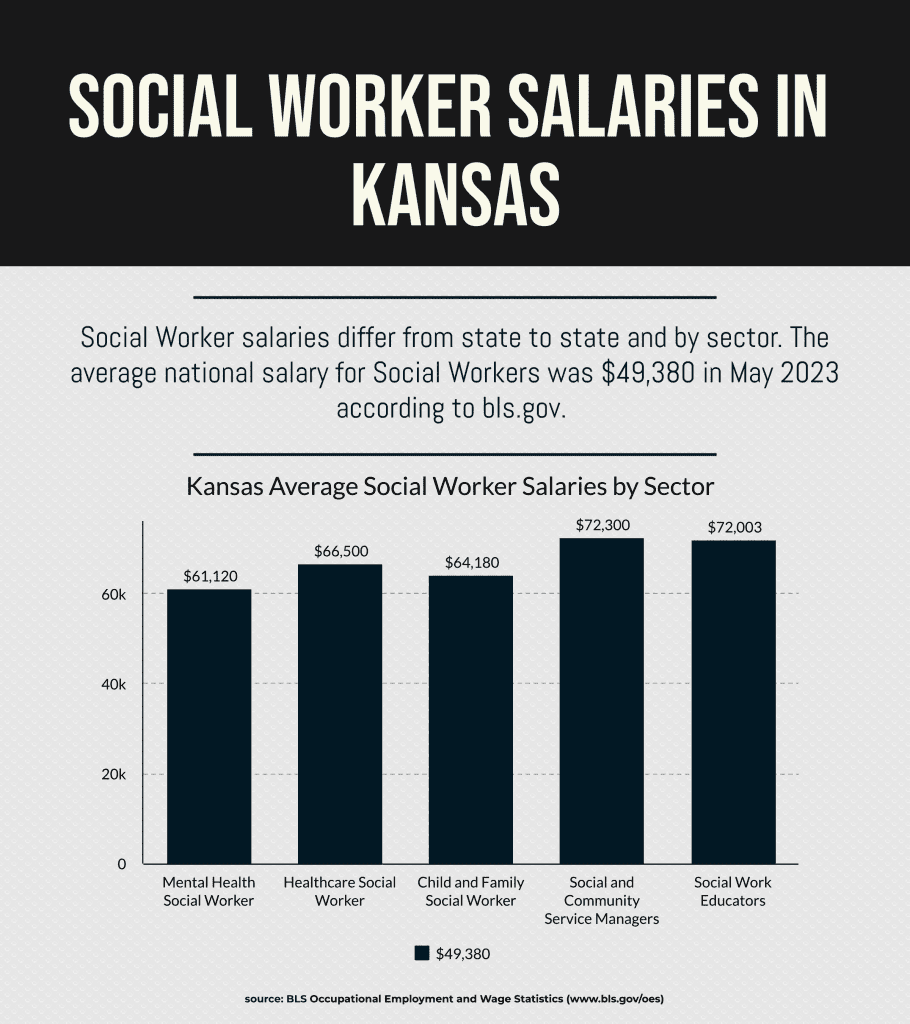
Learn how to become a licensed Social Worker in Kansas with information about education, state licensing, career, and employment.
Kansas is primarily known for its vast expanse of flat prairie lands, earning it the nickname “The Sunflower State” due to its stunning fields of sunflowers. However, the state also features some areas of rolling hills and wooded valleys. The Arkansas River flows through the state, dividing it into two distinct regions: eastern Kansas, which is more densely populated and urban, and rural western Kansas.
Kansas has a diverse economy, with agriculture being a significant contributor. It produces vast quantities of wheat, corn, sorghum, soybeans, and sunflowers. The state is also home to various industries such as aviation and aerospace, manufacturing, oil, gas,and mining. Additionally, Kansas has a robust healthcare sector, with several major medical centers and hospitals.
Kansas is known for its strong emphasis on education. The state is home to numerous universities and colleges, including the University of Kansas, Kansas State University, Wichita State University, and Emporia State University. These institutions offer a wide range of academic programs and research opportunities.
What Are The Clinical Social Work Education Requirements In Kansas?
In Kansas, the education requirements for licensed clinical social workers vary depending on the type of social work and the level of licensure desired. Here are the general requirements:
Bachelor’s degree: To become a Social Work Baccalaureate (SWB), a minimum of a bachelor’s degree in social work (BSW) from a program accredited by the Council on Social Work Education (CSWE) is required. This level of licensure allows for entry-level positions for a licensed bachelor social worker. You may need three professional references to get into a program.
Master’s degree: To become a Licensed Master Social Worker (LMSW) in Kansas, you need to have a master’s degree in social work (MSW) from a CSWE-accredited program. This degree qualifies licensed master social workers for more advanced social work positions. You may need three professional references to get into a program.
Clinical licensure: Clinical licensure is required for those interested in providing clinical social work services, such as therapy and counseling. To become a Licensed Specialist Clinical Social Worker (LSCSW) in Kansas, you must have an MSW degree from a CSWE-accredited program, complete two years of supervised clinical experience, and pass the Clinical Examination from the Association of Social Work Boards (ASWB).
It’s important to note that specific requirements may vary, so checking with the Kansas Behavioral Sciences Regulatory Board for the most up-to-date and detailed information regarding education requirements for clinical social workers in Kansas is recommended.
What Are the Social Work Licensing Requirements in Kansas?
In Kansas, social workers are required to be licensed in order to practice. The licensing requirements include the following:
Education: Applicants must have a bachelor’s degree in social work or a master’s degree in social work from an accredited institution.
Field Experience: Applicants must complete at least 4,000 hours of supervised social work practice. This can include paid work or internship experience.
Examination: Applicants must pass the Association of Social Work Boards (ASWB) examination. The specific exam required depends on the level of licensure being sought (e.g., Bachelor’s, Master’s, or Clinical).
Background Check: Applicants must undergo a criminal background check, which includes fingerprinting.
Application: Applicants must complete and submit an application to the Kansas Behavioral Sciences Regulatory Board (BSRB) along with the required fee.
Licensed social workers can be granted licensure in Kansas upon meeting these requirements, such as a bachelor’s degree. The specific level of licensure will depend on the applicant’s education and experience. The license must be renewed periodically, usually, every two years, and licensed social workers must also meet continuing education requirements to maintain their license.
Can You Get A Social Work License by Endorsement In Kansas?
Yes, obtaining a social work license by endorsement in Kansas is possible. Social workers who are licensed in another state may seek licensure in Kansas through a process called “licensure by endorsement.”
To obtain a social work license by endorsement in Kansas, the following requirements must generally be met:
Education: Applicants must have a bachelor’s or master’s degree in social work from an accredited institution, similar to the requirements for initial licensure in Kansas.
Licensure: Applicants must hold a current and unrestricted social work license in another state or jurisdiction. The license should be in good standing with no disciplinary actions or restrictions.
Examination: Depending on the level of licensure being sought, applicants may need to pass the appropriate ASWB examination.
Application: Applicants must complete and submit an application for endorsement to the Kansas Behavioral Sciences Regulatory Board (BSRB). The application should include all required documentation, such as transcripts, verification of licensure from the current state, and any applicable fees.
Background Check: Applicants will need to undergo a criminal background check, including fingerprinting, similar to the requirements for initial licensure.
Additional Requirements: Kansas may have additional requirements for endorsement that applicants must fulfill, such as completing certain forms or providing additional documentation.
It is important to note that specific requirements for licensure by endorsement may vary, and it is recommended to check with the Kansas Behavioral Sciences Regulatory Board (BSRB) for the most up-to-date and accurate information on the endorsement process.
How Much Does a Social Worker in Kansas Make?
The salary of social workers in Kansas can vary depending on factors such as education level, experience, and the specific field of social work. According to Indeed data from May 2023, the mean annual wage for social workers in Kansas was $62,117.
Social workers licensed at the master’s level work as substance abuse social workers, specialist clinical social workers, healthcare social workers, on-site practicum supervisor, professional ethics, direct client contact, school social workers, and clinical social worker lscsw that works in mental disorders. To get a job, you may need three professional references.
It is important to note that these figures represent a general average and that salaries can vary based on location, employer, and other factors. Social workers in metropolitan areas, such as Kansas City, may earn higher salaries than those in rural areas. Additionally, social workers with higher levels of education, such as those with a master’s degree in social work or advanced certifications, may also have higher earning potential.

What Type of Careers Can Social Workers Have in Kansas?
There are various types of careers that social workers can pursue in Kansas. Some common career options for social workers in Kansas include:
Child and Family Social Worker: These social workers often work in child welfare agencies, providing support, advocating for children and families, and working to ensure their safety and well-being. They may conduct investigations, provide counseling, and facilitate placement services.
School Social Worker: School social workers provide support and resources to students, families, and school staff in educational settings. They may address behavioral and emotional issues, provide counseling, connect families with community resources, and support students’ overall well-being.
Healthcare Social Worker: These social workers work in hospitals, clinics, and other healthcare settings. They support patients and their families, assist with discharge planning, connect patients with community resources, and provide emotional and practical support during challenging times.
Mental Health and Substance Abuse Social Worker: Social workers in this field work with individuals struggling with mental health disorders or substance abuse issues. They may provide counseling, develop treatment plans, connect clients with appropriate resources and support groups, and help individuals navigate the challenges of mental health or addiction.
Geriatric Social Worker: Geriatric social workers provide support and advocate for older adults and their families.
They may assist with long-term care planning, connect clients with community resources, provide counseling, and address aging-related issues, such as caregiver stress and end-of-life planning.
Criminal Justice Social Worker: Social workers in the criminal justice system may work with offenders, parolees, or individuals involved in the juvenile justice system. They may provide counseling, develop treatment plans, facilitate reintegration into the community, and assist with addressing issues related to rehabilitation and reducing recidivism.
These are just a few examples of the many career paths available to social workers in Kansas. The specific role and responsibilities of a social workers can vary depending on the population they serve and the setting in which they work. Social workers licensed at the master’s level work with mental disorders. Some of those can be online social work programs.
What Is It Like Being A Social Worker In Kansas?
Working as a social worker in Kansas can be rewarding but also challenging. Social workers in Kansas play a crucial role in helping individuals, families, and communities cope with various social issues and improve their well-being. Here are some aspects of working as a social worker in Kansas:
Client Diversity: Kansas is a diverse state with different populations and communities. Social workers can work with individuals and families from various backgrounds, cultures, and socioeconomic statuses.
Range of Social Issues: Social workers in Kansas address a wide range of social issues, including poverty, child welfare, mental health, substance abuse, domestic violence, aging, and more. They work to address systemic problems and assist individuals in overcoming personal challenges.
Collaboration: Social workers in Kansas often collaborate with other professionals, such as psychologists, counselors, doctors, educators, and law enforcement, to provide comprehensive services to clients. Interdisciplinary collaboration is essential to address complex social issues effectively.
Advocacy and Policy: Social workers in Kansas advocate for policy changes and social justice to improve the lives of clients and communities. They may engage in grassroots efforts, participate in legislative advocacy, and work within organizations to influence policies and practices.
Case Management: Social workers in Kansas often handle case management responsibilities, which include assessing client needs, developing care plans, coordinating services, and monitoring progress. They may connect clients with resources, provide counseling, and ensure they receive the necessary support and interventions.
Support and Counseling: Social workers in Kansas provide support and counseling to individuals and families facing various challenges. They help clients develop coping skills, navigate difficult situations, and access necessary services and resources.
Burnout and Vicarious Trauma: Working as a social worker can be emotionally demanding, as professionals often encounter clients dealing with trauma, adversity, and challenging life situations. It is important for social workers in Kansas to take care of their own well-being and seek support to prevent burnout or vicarious trauma.
Continuing Education and Professional Development: Social workers in Kansas are required to engage in continuing education to maintain their licensure. This provides opportunities for professional growth, learning new techniques and interventions, and staying updated on best practices.
Overall, working as a social worker in Kansas can be fulfilling as social workers have the opportunity to make a meaningful impact on individuals, families, and communities. However, it can also be emotionally challenging, requiring dedication, compassion, and ongoing self-care.
Related:
- Guide on How to Become a Social Worker in Indiana
- The 30 Accelerated 1 Year MSW Programs Online
- Guide on How to Become a Social Worker in Colorado
- Associate Degree in Human Services in the United States
- Guide on How to Become a Social Worker in Louisiana
- What is a Bachelor of Science in Social Work?
- How to Become a Licensed Clinical Social Worker

